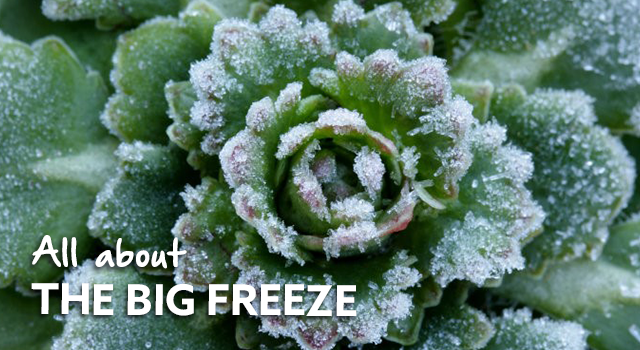The big freeze

Some of the most common questions asked in the garden centre in winter revolve around frost, frost damage and which plants are the most frost-hardy. The frost season does require some additional plant care, but you can reduce damage dramatically by using a few extra products and some forward thinking.
WHAT DOES IT LOOK LIKE?
Frost damage doesn’t necessarily mean you will see icicles or a layer of white powder over the leaves. Most plants don’t suffer from frost damage until the temperature drops below 0°C. As the temperature drops on a clear night towards zero degrees and below water inside the plant cells expands as it freezes. Then as the frosty night is followed by a warm sunny day a rapid thaw of the plant causes the plant tissue to explode. Frost damaged plant tissue may be brown or black affecting the young growing tips and any exposed leaves, overall the plant looks as though it’s been burnt.
LANDSCAPING SOLUTIONS
Evaluate your garden for areas that will likely form frost. Cold air is heavier than warm air, in a garden cold air will roll along the ground and settle in hollows. A fence or hedge will interrupt the flow causing cold air to pool behind it making a frost trap. To help overcome this problem leave a break in hedges or have a slatted fence to improve air flow.
Buildings or solid structures absorb heat during the day and radiate it at night raising the temperature surrounding it for a few metres, creating a frost-free zone for tender plants. Tree cover will reduce frost as they shelter plants from dew and the canopy slightly reduces heat loss at night. Mulch acts as an insulator and creates a barrier between freezing air and soil, protecting plants from rapid freezing and thawing.
PLANT COVERS

Fabric covers will prevent freezing air from coming into contact with the moisture on your plants and on the ground, trapping radiant heat from the soil and preventing cold damage.
Frost cloth is a lightweight fabric that can be laid directly on top of plants or floated above the plant on a frame. It’s a gauzy type of spun-bonded polypropylene fabric allowing 85-95% of light to pass through. It can be therefore left on plants for an extended period of time.
Shade-cloth can also be used as a temporary cover but doesn’t offer as much light so will have to be lifted during the day. Weight will also hinder use on younger plants unless it is used over a frame, not restricting branches and crushing young shoots.
CHEMICAL HELP
Using a chemical frost protection product is another way to ensure damage to plants is greatly reduced. Chemical frost protectants offer an invisible semi-permeable membrane adhering to the plant without causing any chemical injury or change in normal growth. This provides a frost tolerance of as much as four degrees down to minus four degrees and a minimum of three weeks protection. They are water-based, non-toxic, harmless to the environment and safe to use on edibles.
ADD MORE WATER??
Watered plants hold up to four times more heat and sprinkling water continuously over plants when they have been hit with frost, at the right time, can actually be beneficial in reducing damage to plants. You may have been caught off guard, watering allows the plant to defrost much slower than being hit when frozen with sunshine. To get good results you must water all the way through the frost or at the end of the frost before the sun hits the garden bed. By continuously watering either by handheld hose or sprinkler system the damage will be lessened to the plant by allowing a slower defrost.
STRATEGIES
- Keep soil moist, dry soil can exacerbate frost damage
- Plant frost-tender plants under tree canopies for protection
- Protect individual seedlings and tender plants with cloches which you can remove daily
- Move potted plants onto a veranda or close to a wall
- Move tropical indoor plants away from bare windows and out of chilly draughts
- Don’t prune damaged growth from frost-affected plants this will stimulate soft new growth, wait until the danger of frosts has passed.





